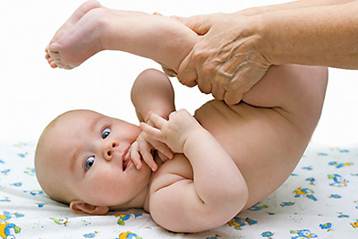Babies’ necks can prop their heads, so they are very interested in
observing the outside world.
4-month-old babies have
outstanding development in controlling the moves of their heads and limbs.
1. Babies’ brains have
been developed
Practical studies show
that early experience and awareness in the first stage of their lives will be
bricks forming their thought, learning, and development in intelligence later.
A newborn baby’s brain
has 100 billions of cells. These cells will be connected into a grid as a
mature brain. Before the age of 3, babies’ brains will form about 1 million
billion of connections. These connections are built based on babies’ hobbies,
discoveries, and process they have learnt from the world around.

Early experience in the
first stage of babies’ lives helps form their thought.
2. Understand
familiar games
Through moms’
expression, look, and attitude, babies learn many things. When they hit a toy,
or reach and shake a tintinnabulum, connections in their brains will be formed.
Incredibly, these connections will help them throw basketball accurately, solve
quickly and exactly arithmetic problems, or play guitar skillfully some day.
Obviously, babies will learn many interesting things
through their favorite activities. If they enjoy lying supine and touch toy,
lie beside and talk to them. If they want to be held, gently hold them and
describe interesting things of the outside world through your prism. They must
be very interesting.
Developing babies’
interests, hobbies from the first years of their lives is what you have to do
to germinate their talent.
3. Massage 101
Stroking is a simple
but extremely effective way to help babies’ brains develop early and strengthen
maternal/paternal love. Embracing or rubbing babies when they are sleepy is a
method to release important hormone for their growth.
Studies show that
babies that are regularly massaged gain weight faster and sleep deeper than
those who are not. Babies who are massaged also secrete less cortisol hormone
limiting growth and development.

Stroking is a simple but
extremely effective way to help babies’ brains develop early.
4. Read book with
babies
It is never too early
to begin reading book with babies. Start with small, hard books that have many
pictures. The ways babies read book are touching the cover, trying to turn the
page, watching you read attentively, and even tasting the book.
Babies may only be
interested in book for a while, but anyway it is still very good for their
development. Your alternate low and high voice really attracts babies and makes
a good impression on them. Besides, touching book is also important experience.
5. Moving skills
Some studies suppose
that babies know how to turn later since when sleeping, they are placed supine
to avoid sudden infant death syndrome. Therefore, when babies are awake,
sometimes placing them on prostrate lying is very important. This helps their
bodies get healthier.
In the 4th
month, babies have outstanding development in controlling the moves of their
heads and limbs. After they are turned to prostrate lying, they can lift their
heads, prop by their arms to lift their chests and rotate their heads. They
will keep this posture in a few seconds.
Babies’ legs are
getting straighter and straighter after every week. They can stretch straight
their legs when being hold, and try to press them to flat surface.
Babies’ bodies are
focusing strength on their necks. Now, their necks can prop heads, so they are very interested in
observing the outside world. They still need parents to prop their backs when
sitting, but they are trying to learn many ways to control their heads.
While their legs and
necks are developing and becoming stronger, so are their arms. They enjoy
waving both arms at once, brandishing them up and down, but now they are
practicing to control actions more accurately.
6. Their teeth
begin to sprout
Babies’ first teeth are
prepared readily. The first sprout tooth may appear in this month.
Signals of teeth sprouting include:
o Salivation (might have appeared many times at
the week before tooth sprouts)
o Appearance of red rash due to too much
salivation
o Putting things into mouth and gnaw because of
itch
o Feeling uncomfortable (usually at mid-night)
o Refusing to suck milk
o Pulling ears or rubbing cheeks due to hurting
o
Diarrhea